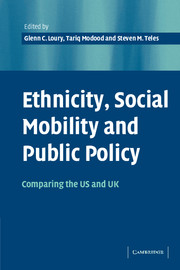Book contents
- Frontmatter
- Contents
- List of figures
- List of tables
- List of contributors
- Acknowledgements
- Introduction
- Part I Historical overviews
- Part II Informal social networks
- Part III Formal structures
- Part IV Political institutions and processes
- 16 Ethnicity and political mobilization in Britain
- 17 Political institutions and minority mobility in the USA
- 18 Race, state, and policy: the development of employment discrimination policy in the USA and Britain
- 19 Regime effects: ethnicity, social mobility, and public policy in the USA and Britain
- Part V Normative analysis
- Author index
- Subject index
- References
16 - Ethnicity and political mobilization in Britain
Published online by Cambridge University Press: 22 September 2009
- Frontmatter
- Contents
- List of figures
- List of tables
- List of contributors
- Acknowledgements
- Introduction
- Part I Historical overviews
- Part II Informal social networks
- Part III Formal structures
- Part IV Political institutions and processes
- 16 Ethnicity and political mobilization in Britain
- 17 Political institutions and minority mobility in the USA
- 18 Race, state, and policy: the development of employment discrimination policy in the USA and Britain
- 19 Regime effects: ethnicity, social mobility, and public policy in the USA and Britain
- Part V Normative analysis
- Author index
- Subject index
- References
Summary
In this chapter “ethnic minority” means people of non-European descent (nonwhites) who, or whose families, migrated to Britain, mainly in the period from the 1950s to the 1980s. Foremost amongst these are people from the former British Empire/Commonwealth in the Caribbean, Africa, South Asia, and Hong Kong, the large majority of whom entered Britain as British citizens, and their offspring. As most of the latter, even by the end of the 1990s, were young adults or children, the story of political mobilization to date is mainly about the Commonwealth-born, though of course increasingly the “second generation” are remaking this politics.
If we think of political mobilization as something like this: interaction and participation in the political system to register protest, win or support allies, defeat opponents, influence political processes, initiate, modify, or prevent policies, win public resources, or seek to achieve some other political goal, including the basic goals of gaining legitimacy for one's presence in the country and for one's existence as a collective presence of a certain sort. Then, the politics I am interested in is not simply focused on governments and political parties but is an arena in which rights and membership, cultural obligations and sense of belonging are articulated, debated, and contested, as well as enacted in laws and policies. And I am particularly interested in the public discursive dimension of mobilization. The question I want to address in this chapter is what have been the character and processes of ethnic minority political mobilization in Britain?
- Type
- Chapter
- Information
- Ethnicity, Social Mobility, and Public PolicyComparing the USA and UK, pp. 457 - 474Publisher: Cambridge University PressPrint publication year: 2005
References
- 11
- Cited by

